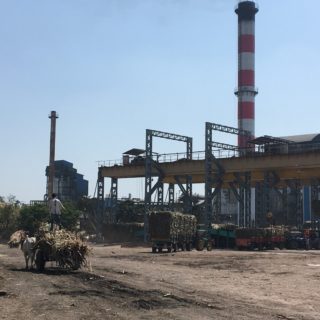Joint UK-India investment of £10 million
The UK-India Industrial Waste Challenge is a partnership between UK Research and Innovation (UKRI) and Department of Biotechnology, Government of India (DBT). This is a joint UK-India investment of £10 million, funding projects aiming to reduce industrial waste and pollution in India from the sugar cane, paper and pulp and municipal solid waste sectors.
There are 526 sugar mills operating in India, which crush more than 200 million tons of sugarcane annually. The vWa consortium is developing a bio-refinery platform for valorising waste from sugar cane and associated industries in India. These industries produce large amounts of waste biomass: 80 million tons (MT) of bagasse, 10 MT of press mud, 25 MT of cane waste and 45 billion litres of distillery spent wash and bagasse pith.
On arrival in sunny Mumbai, we took a 4-hour tourist trip by taxi to see the bustling city, with its extreme traffic and crowded streets. The mid-term meeting began later that evening with an outdoor meal and drinks reception, enabling the academic and industrial partners to meet. The following two days consisted of each project reporting on progress, along with discussion. This was enlightening due to several groups working on projects utilising lignocellulosic hydrolysate as a source of sugars for fermentation. Different methods for pre-treatment including microwaves, cavitation and ultrafiltration are being explored, and a variety of products targeted including food additives, bulk chemicals and biogas.
Following the mid-term meeting, four of us from the vWa project went on to visit the Vasantdada Sugar Institute (VSI) at Pune, and had a tour of the Baramati Agro Ltd sugar mill at Shetphalgadhe. The sugar cane industry in India supports nearly 60 million farmers and their families. The VSI is a research and consultancy cooperative, with 146 sugar mills and 74 distilleries as members. Each farmer cultivates a small 2-5 acre crop of sugarcane, and the sugar mill harvests the cane and takes it to the mill for processing.
The cane is shredded and crushed with a fibrizer and rollers to extract the juice, resulting in a mountain of bagasse waste. The juice is purified and crystallised by boiling, plus the addition of lime and sulphites, which creates a press-mud waste. The sugar mill generates 22MW of electricity from burning some of these wastes in a large boiler, of which approximately 7MW is used to power the mill. The molasses left after boiling the sugarcane juice are fermented and distilled to produce ethanol, with 50% purity ethanol sold to local pharmaceutical companies. The ethanol is further concentrated using molecular sieves to >98% for sale to fuel companies for blend-in to transport fuel. After departing the sugar mill, we joined these tankers, along with many other from the various chemical and pharmaceutical industries in the region, jostling for position on the road back to Mumbai.
I would like to thank the organisers and hosts from the UK and India of the meeting at IIT Bombay; Dr. Sanjay Patil and all the others from the VSI for their hospitality while in Pune; Prof. Nigel Minton and Dr. Ying Zhang for supervision; the BBSRC for funding.
By CCnet Member – Dr Gareth Little

